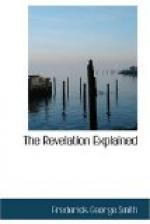6. And I heard as it were the voice of a great multitude, and as the voice of many waters, and as the voice of mighty thunderings, saying, Alleluia: for the Lord God omnipotent reigneth.
7. Let us be glad and
rejoice, and give honor to him: for the
marriage of the Lamb is come,
and his wife hath made herself
ready.
8. And to her was granted
that she should be arrayed in fine
linen, clean and white:
for the fine linen is the righteousness
of saints.
9. And he saith unto
me, Write, Blessed are they which are
called unto the marriage supper
of the Lamb. And he saith unto
me, These are the true sayings
of God.
10. And I fell at his feet to worship him. And he said unto me, See thou do it not: I am thy fellowservant, and of thy brethren that have the testimony of Jesus: worship God: for the testimony of Jesus is the spirit of prophecy.
The scene of this vision is laid in heaven. John heard a great voice of much people saying, “Alleluia; Salvation, and glory, and honor, and power, unto the Lord our God.” This great song of praise doubtless came from the lips of the angelic throng; for immediately the four living creatures and the four and twenty elders reechoed the same shout of praise, saying, “Amen; Alleluia.” Then came a voice from the throne calling upon the servants of God, both small and great, to unite on this occasion in one grand and sacred song of praise; and this sublime chorus fell upon the ear of the enraptured apostle “as it were the voice of a great multitude, and as the voice of many waters, and as the voice of mighty thunderings, saying, Alleluia: for the Lord God omnipotent reigneth. Let us be glad and rejoice, and give honor to him for the marriage of the Lamb is come, and his wife [or bride] hath made herself ready.” Was not here a hearty response to that call, “Rejoice over her thou heaven”? While this scene shows the interest all heaven takes in these wondrous scenes of earth, it is doubtless intended especially to represent the joy and thanksgiving of God’s people who have “gotten the victory over the beast, and over his image, and over his mark, and over the number of his name.”
The marriage of the Lamb which was about to take place was a special theme of joy on this occasion. In the Scripture the term marriage is frequently used to represent a special union between Christ and his people. Thus, the early church was represented as being free because of the death of the law, that they “should be married to another, even to him who is raised from the dead.” Rom. 7:4. So, also, the eternal union of Christ with his people is here described under the figure of marriage. In one sense they have been married to Christ all through this dispensation; in another sense they have not. The church has had the promise of this eternal union, hence she has been betrothed to Christ; but left in




